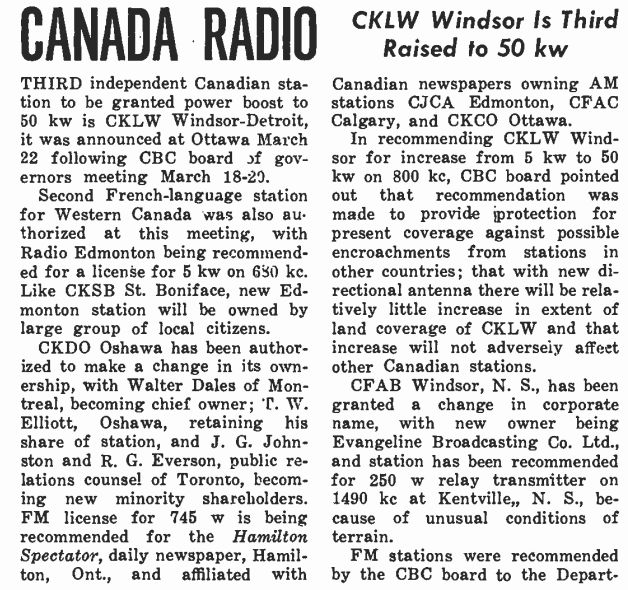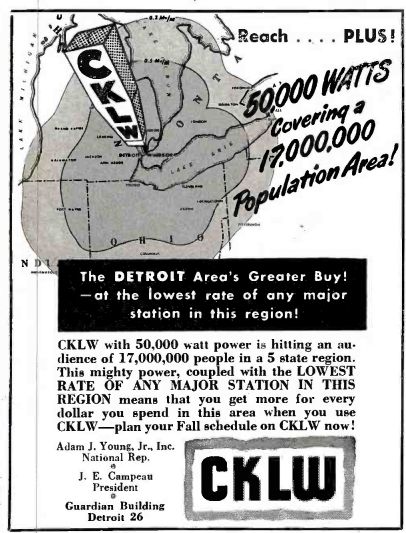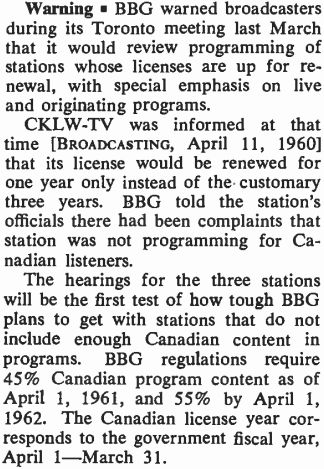- RadioActive
- Moderator
 Offline
Offline
Instant Replay: Why Cancon Rules Go Back Farther Than You Knew
Where would we be without the CBC? Probably a lot richer, considering how many of our tax dollars go to the Corporation every year. The national broadcaster, designed to bring “Canadians to Canadians,” and modeled after the BBC, has been a powerful part of local radio and TV almost since the beginning of both mediums.
How powerful? To the surprise of many, before there was a CRTC or a BBG, the government gave the CBC all the power to decide which private stations received a licence, got power boosts and where they were placed on the dial in Canada. That, thankfully, has not survived into the modern era.
Here’s a look back at not only the CBC but the state of Cancon and the stations competing to reach all Canadians – much to the government’s dismay.
The CBC has long been accused of being pretty stodgy and dedicated more to bringing progressive issues to its audience over what is simply popular – which this story from 1954 appears to affirm.

The broadcaster is often accused of being very left wing and prone to political interference. Which is what may make this controversy back in 1959 so surprising, because it was the network’s own workers who blew the whistle on one-sided programming.

Still, the CBC was quite capable of getting a scoop. Consider what happened in Sept. 1952, the very first day the broadcaster fired up Canada’s first TV station in Toronto.

For many of us, the Front Page Challenges and the Nationals weren’t what we remember when we were growing up. Instead, there were homemade kid shows like The Forest Rangers, Razzle Dazzle, Chez Helene and one other classic – which unbeknownst to most of us, the CBC tried to sell to stations in the U.S.
From 1971:

Both the CRTC and the CBC were fanatics when it came to Canadian Content. And it became embroiled in one of the most unlikely controversies of the early 70s – would airing “Sesame Street” here cause them to go over the limit on their U.S. show allotment? Apparently, Oscar, Bert & Ernie may have been the exception to the rule.

This obsession with American content makes it ironic that when one of this province’s iconic radio stations found huge success in the U.S., the government did everything they could to destroy it. CKLW made no bones about where it thought it would find its biggest audience. And it wasn’t in Windsor.


You might notice those ads read 5,000 watts. But the soon-to-be Big 8 wouldn’t remain that small for long. By 1948, they were about to become a force to be reckoned with, boasting a killer signal that wouldn’t stop in Michigan.



And while most of us remember the coming of Cancon regs in the early 70s as the death knell for the legendary rocker, the CRTC was on management’s case on the issue as far back as 1961 – before there were any official rules at all! In this case, it was on the TV side.

But if CKLW was a Canadian station trying to appeal to a U.S. audience, Buffalo’s TV outlets were the exact opposite. They frequently mentioned covering Canada in their come-ons for “extra value” to would-be advertisers, like in this one from Feb. 1955.

Still, there were times when Channel 4 could have lived without a world that didn’t have simsub. They weren’t too pleased with this ruling from Feb. 1967:

And it wasn’t only WBEN that was looking for Canadian eyeballs.


Its radio station also courted Canucks.

But while Buffalo and Toronto had always remained two separate and very different markets, there was at least one celebrated occasion when a famous and pioneering Queen City jock made the journey to Yonge and Carlton Sts. It was August of 1956.

In the end, CanCon has been a fact of our radio lives for almost 50 years. If you were around when it started you probably know that many broadcast groups – led by CHUM among others – fought with everything they had to prevent the rules from going through. But they failed.
Which is why, with so much opposition, it may be somewhat surprising to read what follows: interviews with station personnel from across the country on the first week of Cancon. Despite all the grousing (and maybe because they thought they could gain favour with the CRTC) suddenly no one seemed to have a real problem with it.






Next week: Radio Goes To War
 1 of 1
1 of 1